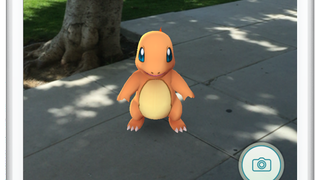Help, my house is a Pokémon Go gym - the reality of living in a virtual space

“I woke up late, hung over. All I really had the energy to do was feed the cats who were very angry I had slept in so long, and drink as much iced coffee as I could. I was standing in my kitchen, and while I’m standing I realise there’s three people in front of the house”. That’s the precise moment when Boon Sheridan realised his Massachusetts home was a gym in Pokémon Go.
Nintendo and Niantic’s new mobile take on Pokémon lifts the ‘gotta catch em all’ idea of snaring and fighting creatures, and applies it to the real world using Google maps and augmented reality. Pokémon can be found the real world, while landmarks and notable locations become things like Pokéstops, where you stock up on supplies. Churches often become gyms where you can fight rival players. Boon lives in an old church.
Living in an old church means many things. Today it means my house is a Pokémon Go gym. This should be fascinating.July 9, 2016
“It just kept going on during the day. I’d go do something and I’d come back to make lunch or get a glass a water and look for people and, sure enough, there’d be one or two people, at one point there was a group of 5 or 6 folks”. It might sound cool to have your house in a game but this is what Central Park, a more publicly accessible Pokéstop, looked like at one point:
Pokemon GO is just insane right now. This is in Central Park. It's basically been HQ for Pokemon GO. pic.twitter.com/3v2VfEHzNAJuly 11, 2016
That wouldn't be great at the end of your path. It also raises a very tangible issue here: Boon’s house now has a value in a virtual world that affects how people treat it in the real one. “In my head I was going ‘Oh man I hope my neighbors don’t think I’ve become a drug dealer,’” Boon says as cars and people began to mill about outside. This intrusion into personal space at least happened in a best case scenario here because, as a tech savy UX designer, Boon was aware of the game, so not completely baffled as to why strangers were lingering around his property.
“It’s very lucky that I knew the app, I knew the game, I knew the mechanics behind it”, he explains. “It really could be awkward. It’s basically having a lot of strangers show up. In their defence, everyone was very respectful of the space, no one crossed the fence, opened the gate, crossed the boundary. A few folks sort of parked in front of my driveway but when I asked them to move they were like ‘Oh crap! I’m sorry I was so into it’. Everyone’s been cool so far but it’s a little weird and it could be a little unsettling”.
This is what I'm a little leery of. People pulled up, blocking my driveway as they sit on their phones. pic.twitter.com/WpRbilk6g6July 10, 2016
This has all happened because Niantic built Pokémon Go from the database of a previous game called Ingress. That was a more sci-fi based AR title that tested the waters of superimposing a game world over the real one (and used around 5 million user generated locations). The important difference though was it had a much smaller player base. “The [Pokemon Go] data was collected for Ingress, which very few people played, very people knew about and, bluntly, very few people gave two bleeps about. But now that database is powering Pokémon Go which is huge,” points out Boon.
So it’s not the first time Boon and other people’s properties have been used in this way but the scale changes the context hugely. “You might have a database of 2000 location and it was being used for 1000 players. Great, no big deal,” he says. “Now you have that same database and you have a million players. The ethics of that completely change in my mind. The context and the scale changes everything”.
Sign up to the 12DOVE Newsletter
Weekly digests, tales from the communities you love, and more
Realistically, the biggest issue is one of consent: “Someone has superimposed this property on top of mine [and] I had no say in the matter,” Boon says. And while the world of Pokémon Go isn’t real, the one you move though to play it is. There have already been plenty of reports of people trespassing to reach certain areas:
I kid you not, I just walked into someone's backyard so I could claim this Gym on Pokemon GO! 😂 pic.twitter.com/h03Q2QqUMzJuly 7, 2016
“Climbing into a garden in the States, depending on where you live, holy crap that’s going to get you shot,” Boon is quick to mention. As well as minor trespass there’s also been reports of armed robbers using the game to target victims. For Boon, issues like this are a very real consideration right now.
While people are currently being very polite and courteous there are layers of responsibility to consider here, both for Pokémon Go and the world of AR gaming in general. “Let’s say later on tonight someone drives up at 2 in the morning and decides to start training,” he says. “Then someone jumps them, attacks them and beats them up. When that person screams for help, who’s the person that has to answer that call? I do. I’m the person that has to take responsibility for what might happen in the physical space.” That might be a hypothetical situation but as Boon makes clear, “I’m not sure that’s a responsibility I would willingly take.”

This virtual overlay “opens up all these unintended consequences,” he thinks. “At the moment Niantic are saying nothing. I haven’t engaged them directly because I’m still trying to understand what the situation is and learn about it”.
This is a man with experience in the area too: “I used to do a lot of work for [digital agency] Razorfish when AT&T was buying Southern Bell. It’s not simple. It had a lot of risk management to it. There were lawyers, there were people paid good money to analyse the risks of the actions the company would take, determine what exposure if any there would be and how to deal with it. I hope that happened at Niantic but I don’t know if it did. This seems so haphazard in this respect. There was very little warning; to be fair I’m not sure what kind of warning they could have been offered. But it certainly feels like everyone's been caught off guard. No one has any good answers and Niantic hasn’t necessarily stepped in with any real discussion either as far as I can tell”.
It’s quite possible however that no one even considered what impact Pokémon Go might have. “If a property owner felt like there was a trespass there might some liability back to the game company,” he explains. “If I’m playing the game and I wander onto someone's property, they freak out, they pull a gun, I pull a gun, shots are fired. The company... There has to be some culpability? There has to be something?”
For the time being though there’s very little Boon can do, and fortunately everyone’s playing nicely. He’s even met the person that ‘owns’ his house/gym in the game.
Woohoo! I met the owner of my gym. Nice guy. pic.twitter.com/uujdC3JYbA10 July 2016
“I’ve taken a very specific stance of ‘look, I might as well enjoy this,’” Boon tells me. “There’s no point in getting angry about it right now, it’s been fun so far”. But it’s not a situation that he wants to continue. “I think the truth of the matter is we'll probably ask to have the gym moved. I don't think long term I want to share the GPS coordinates. I don't want my wife waking up and seeing there are three cars idling outside the house and calling the police. I don’t want the police to come by and say ‘what is happening here?’”.
While long-term Boon is thinking about removing the gym from his house he’s still excited for the future. “I would love for this to be an amazing week where everything opens up a bunch of discussions, and I meet some neighbours and we start talking about it as a design community: ‘Hey what does AR mean?’ It’d be awesome to talk to someone from Niantic and say, hey we’re so happy the game launched but maybe this isn’t a good location, get it taken off and it ends happy. I’d rather have the story end early and happy.”
If you're just starting out, here's some Pokemon Go tips, find out how the future of Pokemon Go will include trading and here's how Pokemon Go has been affecting Spotify downloads. Plus, this is why your local landmarks are Pokestops in the game.

I'm GamesRadar's Managing Editor for guides, which means I run GamesRadar's guides and tips content. I also write reviews, previews and features, largely about horror, action adventure, FPS and open world games. I previously worked on Kotaku, and the Official PlayStation Magazine and website.
Most Popular


